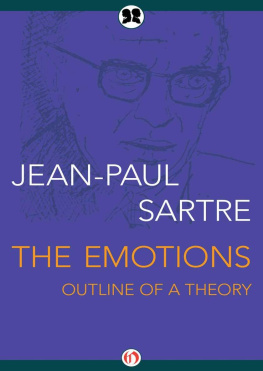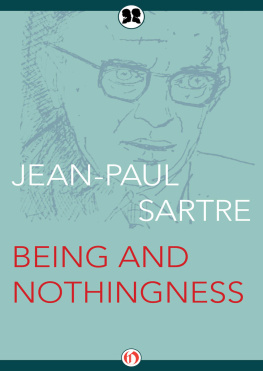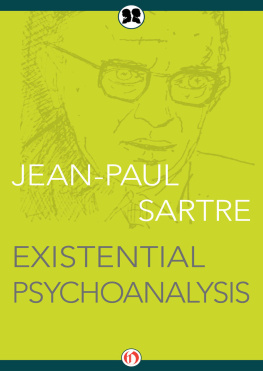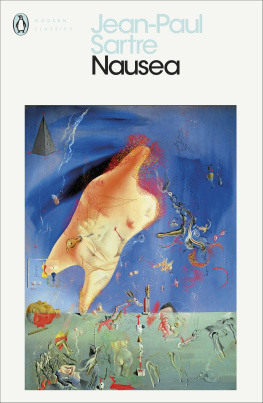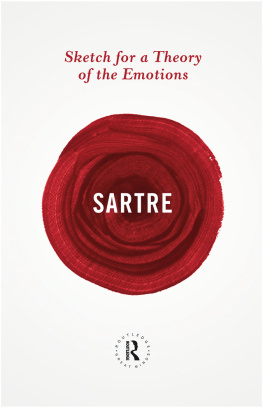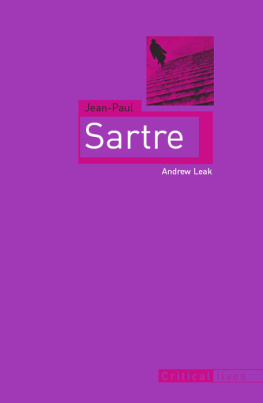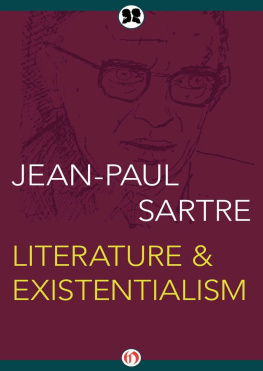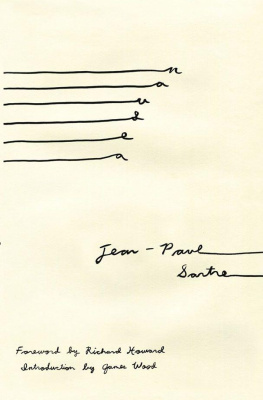Jean-Paul Sartre - The Emotions: Outline of a Theory
Here you can read online Jean-Paul Sartre - The Emotions: Outline of a Theory full text of the book (entire story) in english for free. Download pdf and epub, get meaning, cover and reviews about this ebook. year: 2012, publisher: Philosophical Library/Open Road, genre: Science. Description of the work, (preface) as well as reviews are available. Best literature library LitArk.com created for fans of good reading and offers a wide selection of genres:
Romance novel
Science fiction
Adventure
Detective
Science
History
Home and family
Prose
Art
Politics
Computer
Non-fiction
Religion
Business
Children
Humor
Choose a favorite category and find really read worthwhile books. Enjoy immersion in the world of imagination, feel the emotions of the characters or learn something new for yourself, make an fascinating discovery.
- Book:The Emotions: Outline of a Theory
- Author:
- Publisher:Philosophical Library/Open Road
- Genre:
- Year:2012
- Rating:3 / 5
- Favourites:Add to favourites
- Your mark:
- 60
- 1
- 2
- 3
- 4
- 5
The Emotions: Outline of a Theory: summary, description and annotation
We offer to read an annotation, description, summary or preface (depends on what the author of the book "The Emotions: Outline of a Theory" wrote himself). If you haven't found the necessary information about the book — write in the comments, we will try to find it.
The Emotions: Outline of a Theory — read online for free the complete book (whole text) full work
Below is the text of the book, divided by pages. System saving the place of the last page read, allows you to conveniently read the book "The Emotions: Outline of a Theory" online for free, without having to search again every time where you left off. Put a bookmark, and you can go to the page where you finished reading at any time.
Font size:
Interval:
Bookmark:
The Emotions
Outline of a Theory
Jean-Paul Sartre
Translated from the French by
Bernard Frechtman
Philosophical Library

INTRODUCTION
PSYCHOLOGY, PHENOMENOLOGY,
AND PHENOMENONOLOGICAL
PSYCHOLOGY
P SYCHOLOGY is a discipline which aspires to be positive; that is, it tries to draw its resources exclusively from experience. The age of associationists is certainly gone, and contemporary psychologists are no longer prohibited from asking and interpreting . But like the doctor they want to face their object. When one speaks of contemporary psychology it is still necessary to limit the concept of experience, for, in effect, there can be a host of diverse experiences; for example, one may have to decide whether or not there is an experience of essences or values or a religious experience. The psychologist intends to use only two types of well defined experiences, that which gives us the spatial-temporal perception of organized bodies, and the intuitive knowledge of ourselves that is called reflexive experience. If there are any disputes among the psychologists as to method, they can bear almost solely on the following problem: are these two types of information complementary, should one be subordinated to the other, or should one of them be boldly discarded? But they are in agreement on one essential principle: the inquiry should start, before everything else, with facts .
If we ask ourselves what a fact is, we see that it is defined by that which one should meet in the course of an investigation and that it always presents itself as an unexpected enrichment and a novelty in relation to anterior facts. It is therefore not necessary to count on the facts to organize themselves in a synthetic totality which by itself might yield its meaning. In other words, if one calls anthropology a discipline which claims to define the essence of man and the human condition, psychologyeven the psychology of manis not and never will be anthropology. It does not intend to define and limit a priori the object of its inquiry. The idea of man which it accepts is quite empirical: throughout the world are a number of creatures who present analogous natures to experience. Moreover, other sciences, sociology and psychology, proceed to inform us that there are certain objective connections between these creatures.
No more is needed for the psychologist, in the name of a working hypothesis, to accept prudently to limit his investigations provisionally to this group of creatures. The available sources about them are indeed more easily accessible since they live in society, speak a language, and leave traces of their activity. But the psychologist does not commit himself; he does not know whether the notion of man may not be arbitrary. It may be too vast ; we do not have to put the Australian primitive into the same psychological class as the American workman of 1939. It may be too narrow ; nothing says that an abyss separates the higher apes from the human being. In any case, the psychologist rigorously guards against considering the men about him as his fellow-creatures . This notion of similitude, on the basis of which one might be able to build an anthropology, seems to him ridiculous and dangerous. He will readily admit, with the reservations made above, that he is a man, that is, that he is a part of the class which has been isolated provisionally. But he will take into consideration that this human character should be conferred upon him a posteriori and that he can not, insofar as he is a member of that class, be a privileged object of study, except for the sake of experiments. He will therefore learn from others that he is man and his nature as a man will not be revealed to him in a particular way by the pretext that he is himself what he studies. Like objective experimentation, introspection will furnish only facts.
If it is necessary that there be later a rigorous concept of man and even that is doubtfulthis concept can be envisaged only as the crown of a finished science, that is, one which is done with forever. It would be still only a unifying hypothesis, invented to co-ordinate and grade the infinite collection of facts which have been brought to light. This is to say that the idea of man, if ever it takes on a positive meaning, will be only a conjecture aiming to establish connections between disparate materials and will attain verisimilitude only by its success. Pierce defined hypothesis as the sum of the experimental results which it allows us to foresee. Thus, the idea of man can be only the sum of the established facts which it allows us to unite. However, if some psychologists were to use a certain conception of man before this ultimate synthesis were possible, it would be a strictly personal act, a conducting wire as it were or, better, like an idea in the Kantian sense, and their first duty would be never to lose sight of the fact that it was a regulating concept.
It follows from so many precautions that psychology, insofar as it claims to be a science, can furnish only a sum of miscellaneous facts, most of which have no connection with the others. What can be more different, for example, than the study of the stroboscopic illusion and the inferiority complex? This confusion is not due to chance but to the very principles of the science of psychology. To expect the fact is, by definition, to expect the isolated, to prefer, because of positivism, the accidental to the essential, the contingent to the necessary, disorder to order; it is, on principle, to cast what is essential into the future: That will do for later, when we shall have assembled enough facts. In short, psychologists do not realize that it is just as impossible to get to essence by accumulating accidents as to reach I by adding figures to the right of 0.99.
If their only aim is to accumulate details of knowledge there is nothing to be said; one simply does not see what interest there is in these labors of a collector. But if they are animated, in their modesty, by the hope, in itself praiseworthy, that later on, on the basis of their monographs, an anthropological synthesis will be realized, they are in full contradiction with themselves. It will be said that this is precisely the method and ambition of the natural sciences. The answer to that is that the natural sciences do not aim at knowing the world , but the possible conditions of certain general phenomena. This notion of world has long since vanished beneath the criticism of methodologists, and precisely because one could not both apply the methods of the positive sciences and hope that they would one day lead to discovering the meaning of the synthetic totality which one calls world . But man is a being of the same type as the world . It is even possible as Heidegger believes, that the notions of world and of human reality ( Dasein ) are inseparable. Psychology should resign itself to doing without human reality for precisely that reason, supposing at least that this human reality does exist.
Applied to a particular example the study of the emotions, for example, what will the principles and the methods of the psychologist give us? First of all, our knowledge of the emotion will be added from without to other knowledge about the physical being. The emotion will present itself as an irreducible novelty in relation to the phenomena of attention, memory, perception, etc. You can, indeed, inspect these phenomena and the empirical notion of them we build following the psychologists; you can turn them about again and again as you please and you will not discover the slightest essential connection with emotion. All the same, the psychologist grants that man has emotions because experience teaches him so.
Thus, emotion is first of all and in principle an accident . In textbooks of psychology it is a chapter which follows other chapters, as calcium follows hydrogen or sulphur in textbooks of chemistry. As for studying the possible conditions of an emotion, that is, wondering whether the very structure of human reality makes emotions possible and how it makes them possible, that would appear useless and absurd to a psychologist: what good is it to ask whether emotion is possible precisely because it is.
Next pageFont size:
Interval:
Bookmark:
Similar books «The Emotions: Outline of a Theory»
Look at similar books to The Emotions: Outline of a Theory. We have selected literature similar in name and meaning in the hope of providing readers with more options to find new, interesting, not yet read works.
Discussion, reviews of the book The Emotions: Outline of a Theory and just readers' own opinions. Leave your comments, write what you think about the work, its meaning or the main characters. Specify what exactly you liked and what you didn't like, and why you think so.

